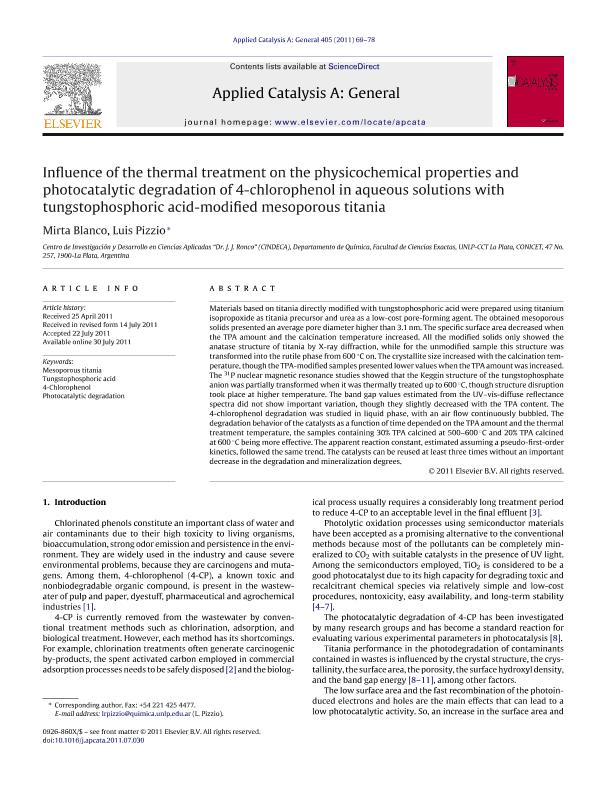Mostrar el registro sencillo del ítem
dc.contributor.author
Blanco, Mirta Noemi

dc.contributor.author
Pizzio, Luis Rene

dc.date.available
2016-03-09T18:04:44Z
dc.date.issued
2011-10-03
dc.identifier.citation
Blanco, Mirta Noemi; Pizzio, Luis Rene; Influence of the thermal treatment on the physicochemical properties and photocatalytic degradation of 4-chlorophenol in aqueous solutions with tungstophosphoric acid-modified mesoporous titania; Elsevier Science; Applied Catalysis A: General; 405; 1-2; 3-10-2011; 69-78
dc.identifier.issn
0926-860X
dc.identifier.uri
http://hdl.handle.net/11336/4707
dc.description.abstract
Materials based on titania directly modified with tungstophosphoric acid were prepared using titanium isopropoxide as titania precursor and urea as a low-cost pore-forming agent. The obtained mesoporous solids presented an average pore diameter higher than 3.1 nm. The specific surface area decreased when the TPA amount and the calcination temperature increased. All the modified solids only showed the anatase structure of titania by X-ray diffraction, while for the unmodified sample this structure was transformed into the rutile phase from 600 ◦C on. The crystallite size increased with the calcination temperature,though the TPA-modified samples presented lower values when the TPA amount was increased. The 31P nuclear magnetic resonance studies showed that the Keggin structure of the tungstophosphate anion was partially transformed when it was thermally treated up to 600 ◦C, though structure disruption took place at higher temperature. The band gap values estimated from the UV–vis-diffuse reflectance spectra did not show important variation, though they slightly decreased with the TPA content. The 4-chlorophenol degradation was studied in liquid phase, with an air flow continuously bubbled. The degradation behavior of the catalysts as a function of time depended on the TPA amount and the thermal treatment temperature, the samples containing 30% TPA calcined at 500–600 ◦C and 20% TPA calcined
at 600 ◦C being more effective. The apparent reaction constant, estimated assuming a pseudo-first-order kinetics, followed the same trend. The catalysts can be reused at least three times without an important decrease in the degradation and mineralization degrees.
dc.format
application/pdf
dc.language.iso
eng
dc.publisher
Elsevier Science

dc.rights
info:eu-repo/semantics/openAccess
dc.rights.uri
https://creativecommons.org/licenses/by-nc-nd/2.5/ar/
dc.subject
Mesoporous Titania
dc.subject
Tungstophosphoric Acid
dc.subject
4-Chlorophenol
dc.subject
Photocatalytic Degradation
dc.subject.classification
Ingeniería Química

dc.subject.classification
Ingeniería Química

dc.subject.classification
INGENIERÍAS Y TECNOLOGÍAS

dc.title
Influence of the thermal treatment on the physicochemical properties and photocatalytic degradation of 4-chlorophenol in aqueous solutions with tungstophosphoric acid-modified mesoporous titania
dc.type
info:eu-repo/semantics/article
dc.type
info:ar-repo/semantics/artículo
dc.type
info:eu-repo/semantics/publishedVersion
dc.date.updated
2016-03-30 10:35:44.97925-03
dc.journal.volume
405
dc.journal.number
1-2
dc.journal.pagination
69-78
dc.journal.pais
Países Bajos

dc.journal.ciudad
Amsterdam
dc.description.fil
Fil: Blanco, Mirta Noemi. Consejo Nacional de Investigaciones Científicas y Técnicas. Centro Científico Tecnológico La Plata. Centro de Investigación y Desarrollo en Ciencias Aplicadas; Argentina
dc.description.fil
Fil: Pizzio, Luis Rene. Consejo Nacional de Investigaciones Científicas y Técnicas. Centro Científico Tecnológico La Plata. Centro de Investigación y Desarrollo en Ciencias Aplicadas; Argentina
dc.journal.title
Applied Catalysis A: General

dc.relation.alternativeid
info:eu-repo/semantics/altIdentifier/doi/http://dx.doi.org/10.1016/j.apcata.2011.07.030
dc.relation.alternativeid
info:eu-repo/semantics/altIdentifier/url/http://www.sciencedirect.com/science/article/pii/S0926860X11004224
dc.relation.alternativeid
info:eu-repo/semantics/altIdentifier/issn/0926-860X
Archivos asociados
